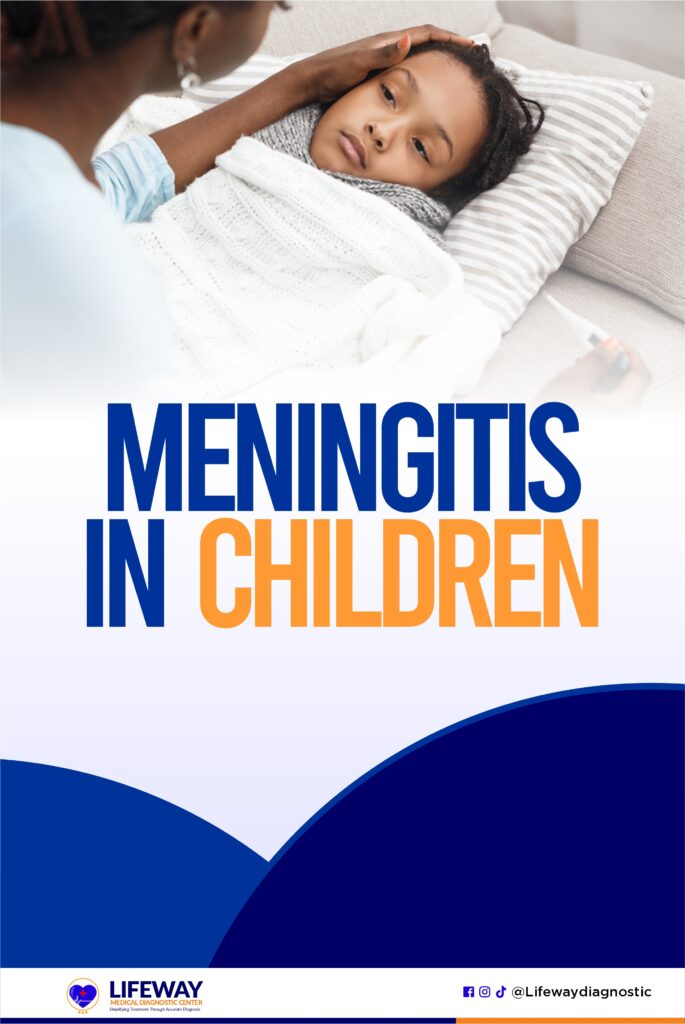Meningitis can have significant long-term effects on children, depending on the cause and severity of the infection.

Meningitis is a serious and potentially life-threatening condition that can affect individuals of all ages. However, it is more common in infants and young children.
As a parent, caregiver, or guardian, protecting your child’s health and well-being is important by being aware of this illness, its symptoms, causes, and preventive measures. Don’t skip this article in a hurry, keep reading.
What is Meningitis?
Meningitis is an inflammation of the protective membranes covering the brain and spinal cord, known as the meninges.
The child catches the germs by breathing in the mist or touching the mucus or saliva of an infected person. The germs then enter the child’s nose or throat and quickly spread through the bloodstream to the meninges.
This disease poses a high risk of infection for children who have cochlear ear implants, experience frequent sinus infections, undergo brain surgery, or have recently sustained a serious head injury.
Meningitis can lead to symptoms such as high fever, severe headache, neck stiffness, sensitivity to light, nausea, and vomiting.
Prompt medical attention is crucial for the diagnosis of the disease to prevent complications and ensure the best possible outcome.
Causes of Meningitis in Children
Viral, bacterial, or fungal infections can cause meningitis. These infections move into the cerebral spinal fluid (CSF).
Bacteria like Streptococcus pneumonia, Listeria monocytogenes, Neisseria meningitidis, and Haemophilus influenza often cause bacterial meningitis, which is the most severe and potentially life-threatening form of the disease.
On the other hand, common viruses including enteroviruses, typically cause viral meningitis. This is more common and usually less severe.
Fungal meningitis is rare but can occur in children with weakened immune systems.
Symptoms of Meningitis in Children
Recognizing the symptoms of meningitis in children is crucial for early detection and prompt treatment. Common symptoms may include:
- Stiff neck
- Irritability or fussiness, especially in infants
- High fever
- Sensitivity to light
- Severe headache
- The fontanelles, which are the soft spots in a baby’s skull, may bulge.
- Nausea and vomiting
- Rash (in some cases)
- Refusing to eat
- Reduced level of consciousness
- Sleepiness or difficulty waking up
- Unusual high-pitched cry
- Seizures
Diagnosing Meningitis in Children
If meningitis is suspected, a healthcare professional will conduct a thorough examination and may recommend diagnostic tests such as:
1. Lumbar puncture
The lumbar puncture is also known as a spinal tap and it is used to collect cerebrospinal fluid for laboratory analysis. Healthcare professionals often perform it on newborns who have a fever of uncertain origin.
2. Blood test
Blood tests can also be conducted to check for signs of infection or inflammation.
3. CT scan or MRI
In some cases, imaging studies such as a CT scan or MRI may be used to assess the brain and spinal cord.
4. Chest X-ray
Healthcare professionals use this non-invasive imaging technique to investigate the presence of any additional sites of infection.
The results of these tests help in confirming the diagnosis of meningitis and determining the underlying cause, whether it’s viral, bacterial, or fungal.
Additionally, the Chest X-ray provides valuable information that guides healthcare professionals in developing an appropriate treatment plan and implementing necessary interventions.
Prevention of Meningitis in Children
Taking several preventive measures is essential to prevent meningitis.
- Vaccination: Ensure your child receives recommended vaccines, including those for Haemophilus influenza type b (Hib), pneumococcal disease, and meningococcal disease.
- Good hygiene: Encourage regular handwashing, especially before meals and after using the restroom.
- To minimize the risk of infection, actively avoid close contact with individuals who have respiratory infections or have been diagnosed with meningitis.
- Prompt medical attention: Seek immediate medical care if your child exhibits symptoms of meningitis.
What are the long-term effects of meningitis in children?
Some of the potential long-term effects of meningitis in children include:
a) Neurological complications:
Meningitis can cause damage to the brain and nervous system, leading to long-term neurological effects.
These may include cognitive impairments, learning disabilities, developmental delays, memory problems, attention deficits, and difficulties with concentration and problem-solving.
b) Hearing loss:
Meningitis can cause varying degrees of hearing loss in children. It may range from mild to severe and can affect one or both ears.
Hearing loss can impact a child’s speech and language development, academic performance, and social interactions.
c) Vision problems:
In some cases, meningitis can result in visual impairment or even blindness. Children may experience difficulties with visual acuity, depth perception, eye movement control, and coordination.
d) Seizures:
Meningitis can increase the risk of seizures in affected children. Seizures may occur during the acute phase of the illness or as a long-term consequence. Proper management and medication can help control seizures in many cases.
e) Motor and coordination issues:
Some children may experience motor and coordination difficulties following meningitis.
This can manifest as muscle weakness, poor balance, coordination problems, and difficulties with fine or gross motor skills.
f) Emotional and behavioral changes:
The experience of meningitis and its impact on a child’s health can lead to emotional and behavioral changes.
Children may exhibit symptoms of anxiety, depression, mood swings, irritability, and changes in their social interactions.
Conclusion
Meningitis is a serious condition that requires urgent medical attention. By familiarizing yourself with the symptoms, causes, and preventive measures, you can play a vital role in safeguarding your child’s health.
Stay vigilant, prioritize vaccinations, practice good hygiene, and seek prompt medical care if you suspect meningitis.
Remember, early detection and treatment can make a significant difference in the outcome for children affected by this illness.
Recommendation
- What causes shortness of breath?
- What are the symptoms of Kidney Disease?
- Health Benefits of Clapping Hands
- Health Benefits of Oatmeal
- Glaucoma: Types, Symptoms, Diagnosis, and Treatment
